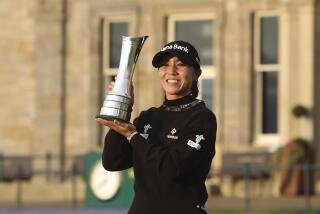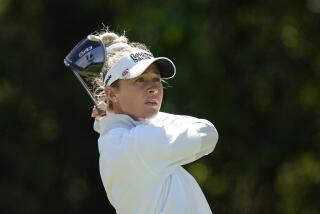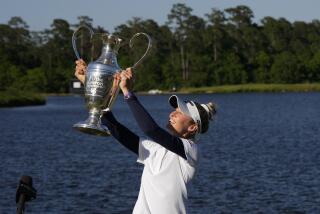It’s Czech, Mate, for Korda in Final
- Share via
MELBOURNE, Australia — Petr Korda, the bouncing Czech, faced a physical challenge at the Australian Open Sunday. Strangely, the test did not come during his championship final against Marcelo Rios of Chile.
That bit of center-court business was tidied up quickly, 6-2, 6-2, 6-2, giving Korda his first Grand Slam title in one of the most one-sided Grand Slam finals in recent years.
Clearly unravaged by the physical demands of the 85-minute match, Korda then began his series of celebratory gymnastic maneuvers, which he initiated at the U.S. Open last year.
First, he performed something that approximated a cartwheel. Then Korda scaled a retaining wall, clambered into the stands and hoisted his 4-year-old daughter, Jessica, onto his hip.
Later, crumbling to popular pressure, Korda executed two of his trademark scissor kicks.
Not bad for a 30-year-old who had just survived a two-week tournament with a fragile body.
“I’ve been waiting for this moment for a long time,” said Korda, whose previous experience in a Grand Slam final was to lose to Jim Courier at the 1992 French Open.
“I didn’t believe it could happen. Before the final, it was the worst 72 hours of My life. Yesterday I had an upset stomach. I was so nervous, it was unbelievable.
“I told myself, I’m not battling for my life. Just enjoy it. I enjoy it from the first moment to the last. It’s been such a long ride, I’m happy with myself. I went to the last stop.”
Korda’s career has been constantly interrupted by injuries. He intimated on Sunday that this season might be his last. Korda will move to No. 2 in the world rankings, behind the man he defeated in the fourth round of the U.S. Open, Pete Sampras. Rios, of Chile, will move to No. 5.
Korda understood before the match that simply by pressuring Rios, 22, he would reap benefits.
“I knew that I am a bigger fighter than he is,” Korda said. “I knew that if I got ahead, he might give up.”
Korda broke in the fourth game of first set to take a 3-1 lead. They traded breaks, then Korda broke Rios to win the set, greatly aided by Rios’ double fault at set point. Rios got in only 38% of his first serves in the set, which was over in 27 minutes.
Rios came out slightly more aggressively in the second set, which is to say he strode briskly onto the court. He was broken in the sixth and eighth games, managing only one point in each of those lost service games.
Whatever body language Rios intended to present to Korda to give the impression that he cared, he abandoned. Rios played the final set sullenly. He heaved his racket at his chair as he walked off the court when Korda served to win the opening game.
Korda broke Rios in the next game and slammed a forehand winner to break Rios on match point.
Rios lost his serve seven times, while breaking Korda once. Perhaps the statistic that most exemplifies Rios’ effort was this: He had seven winners to Korda’s 32.
Rios admitted this week that he had, in the past, been guilty of quitting matches when he was behind. Tennis players call it tanking. Rios made that admission by way of contrasting such behavior with his new incarnation as a fighter.
Nothing in his performance in the final would suggest Rios has rehabilitated himself in that regard. For much of the match, Rios was unable to get any hard-struck ball into the court. He looked like a country club player, hitting off his back foot and spraying errors.
He said the two-week tournament had taken a toll on his body.
“Maybe I was a little bit tired,” Rios said. “Today I didn’t feel that good.”
Korda didn’t get on the tour until he was 21. Now, at 30, he sees his career time clock as being five minutes to midnight. “But the last five minutes can be very long,” he said.
The Czech is grateful to be playing. Three years ago, Korda was in such pain he considered quitting tennis. His wife, Regina Rajchrtova, a former pro player, urged him to continue. Korda had a morbid fear of surgery, but he was finally convinced that unless he dealt with his problem surgically, his career would be over.
To that end, in 1995, Korda underwent surgery for a hernia. The pain continued, unabated. In 1996 he had surgery on his groin.
No sooner had that been cleared up when Korda began having trouble breathing. That led to sinus surgery.
A head cold caused Korda to default out of the U.S. Open, a performance he has had trouble living down.
As of today, he’s feeling fine.
More to Read
Go beyond the scoreboard
Get the latest on L.A.'s teams in the daily Sports Report newsletter.
You may occasionally receive promotional content from the Los Angeles Times.











